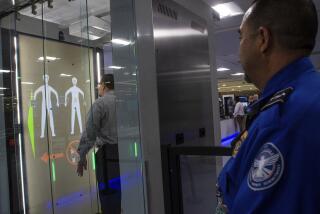Federal Agencies to Pool Lists of Terrorist Suspects
- Share via
WASHINGTON — Federal law enforcement officials plan to pool their lists of suspected terrorists as part of a new national tracking system aimed at plugging a long-standing loophole in the nation’s defenses, officials said Tuesday.
In an unusual burst of agency cooperation, officials from the departments of Justice, State and Homeland Security said they were creating a new entity called the Terrorist Screening Center that will serve as a hub for identifying terrorists and sharing the information with airlines and other industries as well as law enforcement officials around the country.
The center, which is scheduled to begin operations Dec. 1 under the auspices of the FBI, will have no independent authority to collect information on people.
But officials said that consolidating the growing number of federal watch lists should sharpen the ability of enforcement officials to do their jobs.
“It creates a mechanism for one-stop shopping to be used by local, state and federal officers as well as others who may have need for the information,” Larry Mefford, the FBI’s head of counter-terrorism programs, said at a news briefing.
The move, he said, “represents an evolution in our ability to identify suspected terrorists and to stop them before they can do us harm.”
Terrorist “watch lists” have been a flashpoint for investigators and civil libertarians since the Sept. 11 attacks.
A General Accounting Office report in April found there were a dozen such lists maintained by nine federal agencies.
The proliferation of lists has been seen by members of Congress as symptomatic of a long-term lack of cooperation among federal agencies in the war on terrorism.
Civil liberties groups, meanwhile, have said the lists are often rife with errors, including clerical miscues on people’s names, and cited numerous instances of innocent people being unjustifiably detained or harassed.
They add that under the current system, it is next to impossible to delete names from lists once they have been added.
This spring, a joint congressional report examining intelligence and law enforcement breakdowns preceding the Sept. 11 attacks made the creation of a single national watch list one of its chief recommendations.
Among other findings, the report criticized the CIA for routinely failing to pass along information for inclusion on the State Department’s main terrorist watch list, known as “Tipoff,” including incriminating evidence about two San Diego men who were among the 19 hijackers on Sept. 11.
“A consolidated watch list, and the establishment of the Terrorist Screening Center, means that all government law enforcement agencies will be able to run name checks against the same list with the most accurate, up-to-date information about potential terrorists,” Rep. Jane Harman (D-Venice), the ranking minority member of the House Permanent Select Committee on Intelligence, said in a prepared statement.
“Had this action been in place prior to 9/11, we may have been able to disrupt the plot by denying entry to or detaining would-be hijackers,” Harman said.
How many people end up on the list -- and who gets what information -- remain to be ironed out. Mefford said agencies will make recommendations to include specific individuals on the list, and the final decision will be made by the Terrorist Threat Integration Center, a joint CIA-FBI venture that started up this year.
Mefford added that officials are working on rules to streamline procedures for people who believe they have been wrongly listed.
Among the sources the center will draw on are the FBI’s 7,000-name Violent Gang and Terrorist Organizations File, the “no fly” list compiled by the Transportation Security Administration for airline passengers and the State Department’s system for monitoring visa applicants, the latter covering about 110,000 people worldwide.
More to Read
Sign up for Essential California
The most important California stories and recommendations in your inbox every morning.
You may occasionally receive promotional content from the Los Angeles Times.










